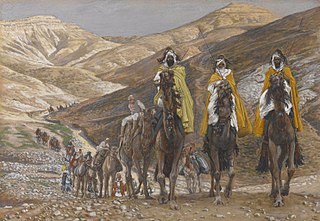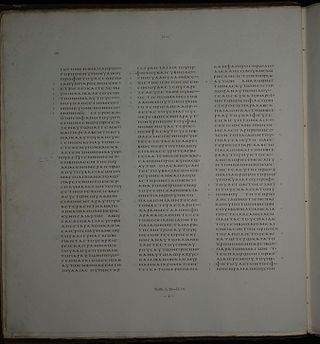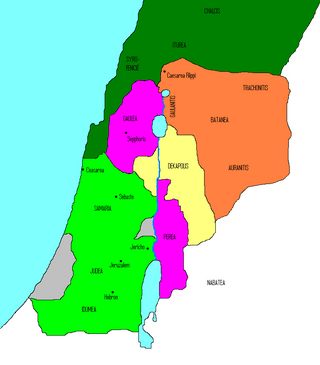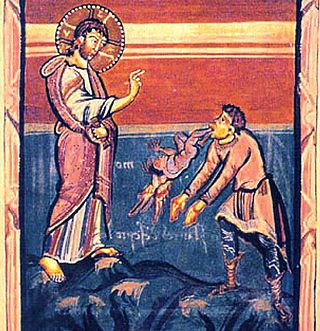Related Research Articles

Matthew 2:1 is the first verse of the second chapter of the Gospel of Matthew in the New Testament. The previous verse ends with Jesus being named by his father. This verse marks the clear start of a new narrative, although the use of a quotation from Isaiah 7:14 in Matthew 1:23 is also reflected in the use of four Old Testament quotations in chapter 2.

Matthew 2 is the second chapter of the Gospel of Matthew in the New Testament. It describes the events after the birth of Jesus, the visit of the magi and the attempt by King Herod to kill the infant messiah, Joseph and his family's flight into Egypt, and their later return to live in Israel, settling in Nazareth.

Matthew 2:12 is the twelfth verse of the second chapter of the Gospel of Matthew in the New Testament. The magi, dispatched by King Herod, have found and paid homage to the Infant Jesus. In this verse this they return home rather than to Herod.

Matthew 2:22 is the twenty-second verse of the second chapter of the Gospel of Matthew in the New Testament. The young Jesus and the Holy Family have just left Egypt after hearing of the death of King Herod.

Matthew 4:16 is the sixteenth verse of the fourth chapter of the Gospel of Matthew in the New Testament. In the previous verses Jesus returned to Galilee after hearing of the arrest of John the Baptist and then left Nazareth for Capernaum. This verse contains the second half of a quote from the Book of Isaiah, implying that these movements were preordained by scripture.

John 4 is the fourth chapter of the Gospel of John in the New Testament of the Christian Bible. The major part of this chapter recalls Jesus' interaction with the Samaritan woman at the well in Sychar. In verses 43-54, he returns to Galilee, where he heals a royal official's son.

Mark 6 is the sixth chapter of the Gospel of Mark in the New Testament of the Christian Bible. In this chapter, Jesus goes to Nazareth and experiences rejection by his own family. He then sends his Apostles in pairs to various cities in the region, where they might also face rejection. Finally, Jesus goes back to the Sea of Galilee and performs some of his most famous miracles, including the feeding of the 5000 and walking on water. This chapter also gives an account of the murder of John the Baptist.

Matthew 14 is the fourteenth chapter in the Gospel of Matthew in the New Testament section of the Christian Bible. It continues the narrative about Jesus' ministry in Galilee and recounts the circumstances leading to the death of John the Baptist.

Luke 9 is the ninth chapter of the Gospel of Luke in the New Testament of the Christian Bible. It records the sending of the twelve disciples, several great miracles performed by Jesus, the story of his transfiguration, Peter's confession and the final departure from Galilee towards Jerusalem. Scottish minister William Robertson Nicoll describes this chapter as unfolding "sundry particulars which together form the closing scenes of the Galilean ministry". The book containing this chapter is anonymous, but early Christian tradition uniformly affirmed that Luke the Evangelist composed this Gospel as well as the Acts of the Apostles.

Matthew 9:9 is the ninth verse in the ninth chapter of the Gospel of Matthew in the New Testament.

Matthew 8:10 is the tenth verse of the eighth chapter of the Gospel of Matthew in the New Testament. This verse continues the miracle story of healing the centurion's servant, the second of a series of miracles in Matthew.

Matthew 9:18 is the 18th verse in the ninth chapter of the Gospel of Matthew in the New Testament.
Matthew 14:3 is the third verse in the fourteenth chapter of the Gospel of Matthew in the New Testament.
Matthew 14:2 is the second verse in the fourteenth chapter of the Gospel of Matthew in the New Testament.

Matthew 8:15 is the fifteenth verse in the eighth chapter of the Gospel of Matthew in the New Testament which relates the Healing the mother of Peter's wife.

Matthew 8:18 is the 18th verse in the eighth chapter of the Gospel of Matthew in the New Testament.

Matthew 15:1 is a verse in the fifteenth chapter of the Gospel of Matthew in the New Testament.
Matthew 12:22 is the 22nd verse in the twelfth chapter of the Gospel of Matthew in the New Testament.
Matthew 14:13 is the thirteenth verse in the fourteenth chapter of the Gospel of Matthew in the New Testament.
Matthew 14:12 is the twelfth verse in the fourteenth chapter of the Gospel of Matthew in the New Testament. It refers to the death of John the Baptist and the burial of his body.
References
- ↑ Robert Witham, Annotations on the New Testament of Jesus Christ, Dublin: 1730.
- ↑ John MacEvilly, An Exposition of the Gospel of St. Matthew consisting of an analysis of each chapter and of a Commentary critical, exegetical, doctrinal and moral, chapter 14, Dublin, Gill & Son 1879.
- 1 2 3 Thomas Aquinas, ed. (1874). "Catena Aurea: commentary on the four Gospels; collected out of the works of the Fathers. Oxford: Parker".
 This article incorporates text from this source, which is in the public domain .
This article incorporates text from this source, which is in the public domain .